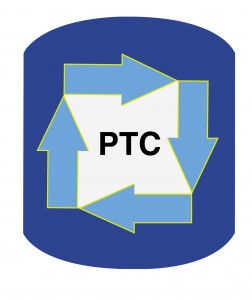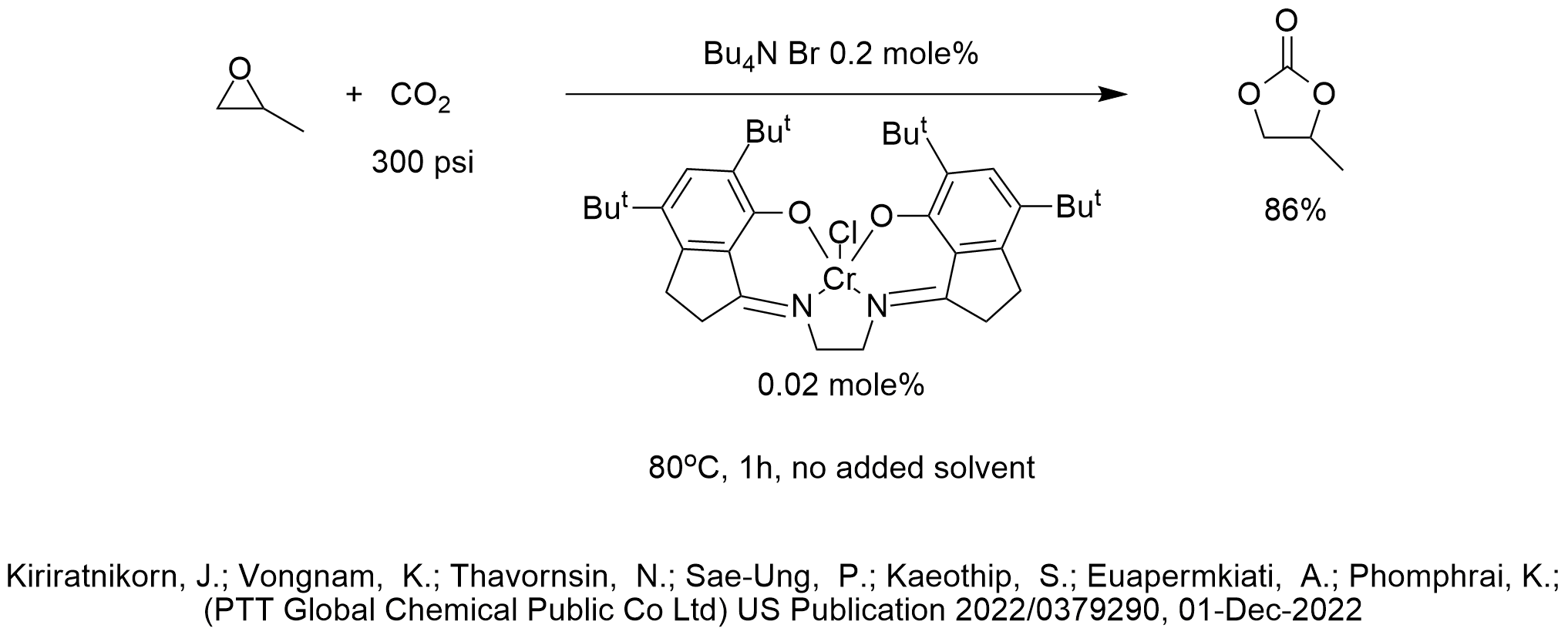A variety of cyclic carbonates were produced by the reaction of carbon dioxide and epoxides. Epoxide reactants include propylene oxide, epoxyhexane, epichlorohydrin, butadiene monoepoxide, styrene oxide, cyclopentene oxide and others. The conversions up to 1 hour reaction time were 50%-83% and the selectivity to the cyclic carbonate was always 100% with no polycarbonate.
The catalyst was a mixture of a chromium complex shown in the diagram and tetrabutylammonium bromide. The role of the tetrabutylammonium bromide is to provide a source of catalytic bromide soluble in the reaction phase, though this is not a classical phase-transfer reaction.
The mechanism is the same as shown on the left side of the diagram in this month’s PTC Tip of the Month (without the aniline). The first step is nucleophilic attack of bromide on the epoxide to form the 1-bromoalkyl-2-alkoxide, aided by coordination with the chromium complex. The alkoxide attacks the carbon of carbon dioxide to form the alkyl carbonate anion. The cyclic carbonate is formed when the alkyl carbonate anion displaces the bromide, which resupplies the bromide for the next cycle.
As noted in this month’s PTC Tip of the Month, iodide performs better than bromide in these situations since iodide is a better nucleophile than bromide and iodide is a better leaving group than bromide. In other words, the inventors would have done better with TBAI than TBAB and since they are using only 0.2 mole% quat salt, the difference in quat salt cost would likely be negligible (especially considering the cost of the chromium complex).
We describe similar reactions and how to optimize cost and performance in our 2-day course “Industrial Phase-Transfer Catalysis.” Now contact Marc Halpern of PTC Organics to leverage your training budget for maximum impact on process R&D performance and efficiency.
About Marc Halpern

Dr. Halpern is founder and president of PTC Organics, Inc., the only company dedicated exclusively to developing low-cost high-performance green chemistry processes for the manufacture of organic chemicals using Phase Transfer Catalysis. Dr. Halpern has innovated PTC breakthroughs for pharmaceuticals, agrochemicals, petrochemicals, monomers, polymers, flavors & fragrances, dyes & pigments and solvents. Dr. Halpern has provided PTC services on-site at more than 260 industrial process R&D departments in 37 countries and has helped chemical companies save > $200 million. Dr. Halpern co-authored five books including the best-selling “Phase-Transfer Catalysis: Fundamentals, Applications and Industrial Perspectives” and has presented the 2-day course “Practical Phase-Transfer Catalysis” at 50 locations in the US, Europe and Asia.
Dr. Halpern founded the journal “Industrial Phase-Transfer Catalysis” and “The PTC Tip of the Month” enjoyed by 2,100 qualified subscribers, now beyond 130 issues. In 2014, Dr. Halpern is celebrating his 30th year in the chemical industry, including serving as a process chemist at Dow Chemical, a supervisor of process chemistry at ICI, Director of R&D at Sybron Chemicals and founder and president of PTC Organics Inc. (15 years) and PTC Communications Inc. (20 years). Dr. Halpern also co-founded PTC Interface Inc. in 1989 and PTC Value Recovery Inc. in 1999. His academic breakthroughs include the PTC pKa Guidelines, the q-value for quat accessibility and he has achieved industrial PTC breakthroughs for a dozen strong base reactions as well as esterifications, transesterifications, epoxidations and chloromethylations plus contributed to more than 100 other industrial PTC process development projects.
Dr. Halpern has dedicated his adult life to his family and to phase-transfer catalysis (in that order!).


